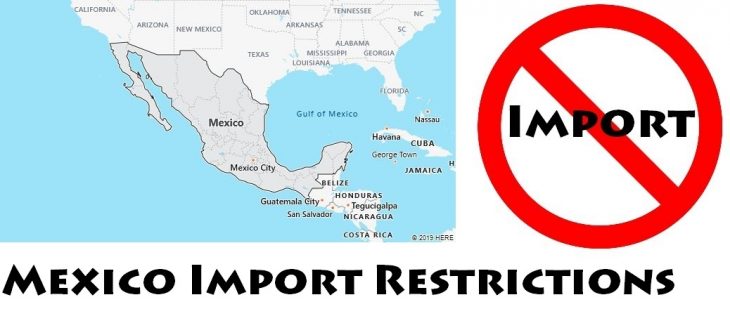Mexico Import Restrictions
In order to enter Mexico, certain goods are subject to specific controls and, regardless of their value and quantity, they require the consent of Mexico government, preferably, license must be obtained prior to passage through the customs, preventing the goods from being retained. On this page, you will see what kinds of items are prohibited from entering the Mexico, and which items need special documentation before exporting to Mexico.
Import regulations
Senders should determine import restrictions from Mexican authorities before posting:
- Alcohol and spirits
- Anti-parasite products
- Animal products
- Ceramic products
- Chemical and pharmaceutical products
- Foodstuffs, prepared
- Footwear
- Health certificate
- Lottery tickets
- Measuring instruments
- Mineral oils
- Narcotics
- Pharmaceutical products
- Paper products
- Plastic and rubber articles
- Textiles and textile articles
- Television receivers
- Tobacco and tobacco products
- Vegetable products
- War materials
- Weapons
- Wood products.
Special documentation requirements
Articles with a value of more than $US300 require an invoice. Senders should separately post a duplicate invoice to the addressee.
Articles with a value of more than $US1000 require a Certificate of Origin.
Poste Restante
Mexico accepts articles for collection at a post office counter only if addressed:
Addressee name, occurre, post office name, postcode, city name, Mexico.
Prohibitions
In addition to items prohibited by Dangerous and Prohibited Goods & Packaging Post Guide and ECI International Courier Regulations, Mexico prohibits:
- Animals and animal products
- Arms and ammunition
- Antiques
- Inorganic and organic chemicals
- Lottery tickets, unauthorised
- Minerals fuels and oils
- Massage appliances
- Obscene or immoral material
- Prosthetics
- Photographic and cinematographic products
- Pharmaceutical products
- Printed articles; books, newspapers- offensive by nature
- Pearls, precious stones and metals
- Toys, games.














































